- Home
- Mary Hooper
The Disgrace of Kitty Grey Page 3
The Disgrace of Kitty Grey Read online
Page 3
There was a quartet playing and when they finished I heard polite applause from the assembled audience, following which a chord was played as if the musicians were going to strike up again. At this point Miss Alice hissed loudly over the screens, ‘No, you must not!’
The heir, the Honourable Peregrine, who was home from school for the occasion, addressed the audience. ‘We now have a surprise for our guests,’ he announced. ‘My mother and father know nothing about this, but I trust they will enjoy it as much as everyone else.’
I heard a little stir in the audience as everyone turned to see how Milord and Lady Baysmith might be taking this announcement and, looking anxiously at the scene, I prayed that the Misses would not extend the performance for too long in case Daisy disgraced herself in their noble presence. I could just see Lady Cecilia from where I was standing; she was dressed regally (but not fashionably), in the old manner of hooped petticoat and crinoline, her hair powdered and teased into cascades of curls.
‘My sisters, Sophia and Alice,’ Peregrine declared, ‘have much pleasure in presenting you with a pastoral scene: Milkmaids at Rest.’
As he said these last words, two of the valets stepped forward and pushed away the screens to reveal, solemn and still, Miss Alice, Miss Sophia and Miss Daisy the Cow, surrounded by pieces of false countryside.
There were some gasps, then a roar of approval and an inordinate amount of clapping, most especially from the young men in the audience. Two naval gentlemen in the back row stood on their chairs to get a better view of the Misses, for they did look very picturesque indeed, dressed as they were in pale, clinging fabric which left little to the imagination. Their pose was held for at least two minutes, gazing over the potted tree into the imaginary distance, and dear Daisy did not disgrace herself either, but stood steady and stoic, occasionally blinking and no doubt wondering where her field had gone.
Another signal was given and the men brought back the screens to hide the scene from view. Miss Alice and Miss Sophia kissed each other, looking very pleased with themselves and I waited for them to see and be pleased with me. Alas, before this could happen, Patience appeared in the hall, beckoning me with some urgency.
I went over.
‘Coo, you’re going to catch it and no mistake!’ she said, not even trying to hide her glee at this notion.
‘How am I?’ I answered. ‘I was only following orders from Miss Sophia and Miss –’
‘I don’t mean because of the cow and all that.’
‘What, then?’
‘Your sweetheart, from the ferry. He’s here in the kitchens wanting to see you. Bold as brass he came, knocking on the kitchen window.’
‘Will’s here?’ My first thought was that he had come to see Mrs Bonny and ask her permission to call on me, but then I realised it was gone nine o’clock. No one in polite company called at such an hour.
‘You’d better get down to the kitchens sharpish! I’ll see to the cow, if you like.’
I was torn, for I’d been looking forward to receiving the Misses’ grateful thanks and perhaps a small silver coin for my trouble, but I didn’t dare hesitate and went straight down to the kitchens.
Chapter Four
‘He’s over there,’ Mrs Bonny said, nodding towards the fireplace. ‘And I need not tell you of the impropriety of this, Kitty. It is most unseemly.’
‘For a dairymaid to have a caller at this hour – really!’ said Mr Griffin. ‘It won’t be tolerated twice, you know that.’
I curtseyed to Mr Griffin in an apologetic sort of way and hurried over to Will, who was hunched over, looking uncomfortable, holding his hat scrunched up in his hands and standing as close to the garden door as it was possible to get without actually being on the other side of it.
‘You shouldn’t have come!’ I hissed, which I know was not very kind of me, but I could not help but be acutely embarrassed by having what seemed like every servant in the household witness this little scene.
‘I had nowhere else to turn.’
‘I don’t understand. What do you mean?’
He shot a look at Mrs Bonny and Mr Griffin. ‘Can we go outside?’ he asked me in a low voice.
I nodded and pulled at the door latch.
‘You’ve got five minutes,’ Mr Griffin said. ‘No longer.’
I thanked him and, as Will and I went outside, saw Daisy on her return journey from the music room, lumbering down the steps into the kitchens, followed by a grinning Patience.
Outside the garden door, there was the stub of a wax candle burning in a sconce, but the moon was hidden by cloud so it was impossible to see very far across the fields. You could hear the wind rustling the new leaves on the trees, however, and, far away, the sound of the river.
‘What is it?’ I asked urgently, worried now about why he was there. Was it something to do with my family? Had one of them been taken ill?
‘I need to ask you something really important.’
I stared at him wonderingly. Surely he wasn’t . . .
‘It’s my sister, Kate – her husband has lost his job on the Cox estate.’
‘Has he?’ I looked at Will, bemused. The Cox family were the other big landowners in the district and I knew Kate’s husband, George, held a position as one of their stockmen. But I couldn’t think what this had to do with me or Will.
‘I must explain myself better.’ Will glanced over to the wide, low brick wall, where I could see something that looked like a bundle of old clothes. ‘George and Kate went to the May Day celebrations today,’ he continued, ‘and later Kate came home to put the children to bed while George stayed on with some of his fellow workers, drinking and carousing.’
I shrugged and nodded. There was nothing unusual in this.
‘But old man Cox turned up and George, being drunk, took it upon himself to list the disadvantages of working for him, saying he was a miserly devil and the men on the Baysmith estate earned far more than he and his fellow workers got from Cox.’
I clapped my hand to my mouth.
‘Eventually, after the name-calling, it fell to fisticuffs. George landed a hefty blow on the old man, and he tumbled back into the fireplace and knocked himself out.’
‘No!’
‘George went home, and the first thing old Cox did when he came to was to send the constable round to Kate and George’s cottage to turn them out.’ Will blew his nose, clearly upset. ‘They had to borrow a hay wagon from one of the farms, load on all their possessions – and the children – and now George and my poor sister have trundled off to who-knows-where.’
‘Oh!’ I exclaimed. ‘But what of . . . ’
He nodded. ‘Yes, Betsy.’
‘Have they taken her, too?’
‘That’s just it. Kate said she couldn’t possibly take on another child, that they had barely enough money to feed themselves and she didn’t know what might happen to them. If George can’t get work – and he might not be able to do that without a Character from his old employer – they’ll end up in the workhouse.’
‘But . . .’ I tried to grasp what this might mean for Will. ‘So Betsy . . . ’
‘My sister said that four children on a wagon was more than enough and she just couldn’t take her.’
I was silent for a long moment, absorbing all this news, and then I asked where she was.
Will pointed to what I’d thought was the bundle of clothes on the wall. ‘She’s there. Asleep.’
‘You’ve brought her here?’
‘I couldn’t think of what else to do with her,’ he said with despair. ‘I couldn’t just abandon her, could I?’ I didn’t say anything to this and he went on, ‘She’s already had a rough time of it – no mother, her dadda dying, then having to go and live with someone who didn’t really want her.’
‘Other children get by,’ I said, which, I own, was a very selfish and unfeeling thing to say.
‘Kitty!’ Will said reproachfully. ‘She’s my little sister.’
I immediate
ly felt terrible. ‘Sorry, Will.’ My eyes filled with guilty tears. ‘I didn’t mean that.’
‘She’s five years old. Would you really have her taken into the workhouse?’
‘Of course not! But I thought you were set on going to live in London. How can that happen now?’
‘I can go later, when things are settled. Maybe George will apologise and he and Kate will come back here to live and –’
‘So where will Betsy stay? You’re surely not going to let her live in your old shed?’
He shook his head. ‘What I was wondering was . . . whether Mrs Bonny would let her stay here.’
‘Here?’ I asked, shocked. ‘Here at the hall?’
Will nodded. ‘She wouldn’t be any trouble! She can stay with me in the day – she’s happy enough doing that – and at night she could just come up here and sleep in any old spot. She’d be happy in the kitchens in front of the fire.’
I didn’t reply, and he went on, ‘The gardeners’ children run around the estate like puppies; one more in the pack would hardly be noticed.’
‘I don’t know if I dare ask such a thing,’ I said.
‘I’m fair desperate, Kitty,’ Will said, taking my hand. ‘It’s the only thing I can think of. I can’t put her in an orphanage. You wouldn’t want to see that happen, would you?’
‘No, but . . . but what if Kate and George don’t ever come back?’
‘Well, I suppose we’ll be starting our married life with a ready-made family,’ he said, squeezing my hand.
I managed to smile, but thought to myself that that wasn’t what I’d wanted at all: I’d wanted us to live in a little cottage on our own and only then, after a year or two, say to Will that it was time that he made a rocking cradle.
‘Kitty! You’ve gone into a dream. What do you think I should do? Should I go and ask Mrs Bonny now, or Mr Griffin – or wait until morning?’
I sighed. ‘I think they’ll take it better coming from me,’ I said. ‘I’ll ask them. Betsy will have to stay the night here, at least.’
‘And I’ll come for her in the morning,’ Will said, and kissed my forehead. ‘Thank you for what you’re doing. I love you.’
My heart gave a jolt at this, but I was too overwhelmed to respond.
‘Milord would throw a fit!’ Mrs Bonny said when I’d finished explaining and begging. ‘This is a dairy farm, not an orphanage. We can’t go taking in stray children willy-nilly!’
Most of the servants had gone to bed, thank goodness, although a scullery maid was there, trying to appear busy polishing the cutlery but actually listening to us for all she was worth.
I looked from Mrs Bonny to Mr Griffin imploringly. ‘But the poor child . . .’
‘What happened to her mother?’ asked Mr Griffin.
‘She died giving birth to Betsy’s twin. The twin died, too,’ I added, and heard a shocked intake of breath from Mrs Bonny.
‘And her father?’ Mr Griffin asked.
I shrugged. ‘He died shortly after Betsy’s ma. I’m not sure what of.’
‘What work did he do?’
‘He worked the ferry, Mr Griffin – had a little cottage down the lane. Will took over the rowing boat but he couldn’t afford the rent on the cottage, so now he stays in the hut down by the water.’
‘Couldn’t the child live there with him?’ Mrs Bonny asked.
I shook my head. ‘That was Will’s first thought, Mrs Bonny, but the place is green with damp all year round and half under water in the winter.’
Neither of them spoke for a while, but I saw them exchanging glances.
‘She would be with Will all day, as she is now!’ I said quickly. ‘He catches enough fish for them to eat, and whenever the baker crosses the river he pays Will in bread. Betsy would not cost Lord and Lady Baysmith a penny! I’m just asking if she could sleep here at the hall, and perhaps be inside during a rainstorm.’
Their silence continued. I could supply Will and Betsy with milk, I thought, and a little cheese and a few pats of butter disappearing into the ferryman’s hut would never be noticed. And it was not all bad, for Betsy would keep Will from going to London.
‘Milord and Milady need not even know she is here,’ I suggested tentatively.
‘Certainly they must know!’ Mr Griffin cut in. ‘But I believe, with Milady’s propensity for charitable works, and knowing the child is motherless, she might look favourably on her staying for a while, until alternative arrangements can be made. What do you think, Mrs Bonny?’
‘I suppose the child could sleep in one of the haylofts, with the gardeners’ and woodcutters’ children,’ Mrs Bonny replied.
I nodded eagerly. There was, I knew, a little row of gardeners’ cottages on the estate, but these comprised only one room with a sleeping alcove, so a lot of the workers’ children slept in one of the barns. Betsy would be a little younger than the others, but this was probably all to the good, for the older girls would want to mother her just as they mothered their little sisters and brothers.
‘And next March when the crops come through she could do a little work,’ I said. ‘Perhaps she could go out as a bird-scarer in the fields.’
Mrs Bonny shook her head and frowned. ‘That’s nearly a whole year away. Let’s hope a proper home has been found for the child by then.’
‘Of course, Mrs Bonny, Mr Griffin,’ I said, dropping a curtsey first to her and then the butler and saying how very grateful Will would be, and that he would be sure to take them over the river on the ferry for free whenever they wanted to go. I said I’d wake Betsy, tell her what was happening and take her over to the hayloft.
As it happened, though, I couldn’t wake her up; she was in the deep, deep sleep of a child. I was feeling guilty by then because of how I’d not really wanted to take her in, and felt I couldn’t just abandon her to wake up in the hayloft, so I took her to my room in the attic and tucked her in at the foot of my bed. I shared a room with Patience and her sister, Prudence, but luckily both of them were asleep by then, so I didn’t have to explain anything. The morning, I thought, would be time enough for that.
As I closed my eyes on the whole day I heard the clocks in the house striking midnight. I considered what had happened and what might happen, and then I remembered that Will had told me he loved me, and that it was the first time.
Chapter Five
‘Why am I here? I don’t like it here . . .’ This is what I heard when I woke the following morning, and opened my eyes in the semi-darkness to see Betsy at the bottom of my bed, staring over the blanket at Patience and Prudence, who were staring back at her.
‘Who are they?’ Betsy asked, her voice trembling.
‘What’s she doing here?’ Patience asked.
‘Where’s she come from?’ said Prudence.
Betsy began to cry and I bent over, lifted her up and put her in beside me. I then shot a look at the other two: an imploring, please-don’t-make-this-hard look.
‘Well, you know Kate and her family have had to go away for a little while?’ I began, explaining it to Patience and Prudence as much as to Betsy, who carried on crying. She didn’t say anything, so I continued, ‘Well, they have, and they don’t know yet where they’re going to be living. When they do find out, I expect they’ll send for you, but in the meantime, guess where you’re going to live?’
But Betsy didn’t want to guess. She carried on crying, while Patience and Prudence got up; one to pour water from the washing jug into the basin and the other to use the chamber pot.
I went on. ‘Well, Mrs Bonny – you like Mrs Bonny, don’t you, Betsy? – is going to let you stay here in the hall at night! That is, not exactly inside, but you can sleep in the hay barn with the other children. And there are lovely little field mice in the hay barn. You like mice, don’t you?’
Betsy nodded and, after a moment, stopped crying.
‘You could have some as pets. Dear little brown fluffy ones,’ I said, hiding a shudder, for I don’t like rodents, big or small. �
��And in the daytime you can play down by the river with Will, just as you usually do.’
‘Every day?’ she asked.
‘Every single day.’
‘In the rain?’ Prudence put in, tipping her bowl of washing water out of the window into the area below. ‘Last May it rained for eighteen days solid.’
‘When it rains,’ I said to Betsy, ‘then you can stay in the barn, if you wish, and play with the other children.’
‘And will I see Miss Alice and Miss Sophia?’
‘Indeed you will,’ I said. ‘You will glimpse them about the place, and whenever they go riding they will come close to the barn and you will see what elegant outfits they are wearing.’
There was a snort from Prudence, for neither of the maids had any truck with the Misses (although you would never know it from all the curtseying and fawning that went on whenever they appeared).
‘Now, you and I will wash our hands and faces and get dressed,’ I continued to Betsy. ‘Then we’ll go and say good morning to Mrs Bonny and Mr Griffin. After that, I’ll take you across the yard so you can see all the other children and find a little corner to sleep in.’
Betsy seemed to absorb all this information – at least, she didn’t start crying again. After a moment or two, however, she asked about Will.
‘He’s at the river with his ferry as usual,’ I answered. ‘And you can go down and see him whenever you like.’
‘Right now?’
‘As soon as you’ve had some breakfast,’ I said. ‘And if you come into my dairy I’ll draw you some fresh milk straight from the cow. You can have milk from Daisy, if you like.’
Patience and Prudence were dressed now, but still staring.
‘So your sweetheart has landed you with a child,’ Prudence said, clearly amused.
‘But not in the usual way!’ her sister giggled.
‘There was nothing else to be done,’ I said in a low voice. ‘Will is going to take care of Betsy during the day and Mrs Bonny is allowing her to sleep in the barn at night. She’s no more than a bairn!’ I added, hoping to draw on their sympathy. ‘I hope everyone will treat her kindly.’

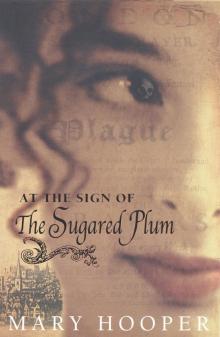 At the Sign of the Sugared Plum
At the Sign of the Sugared Plum Zara
Zara Megan 3
Megan 3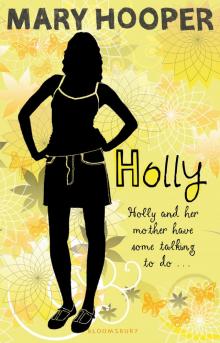 Holly
Holly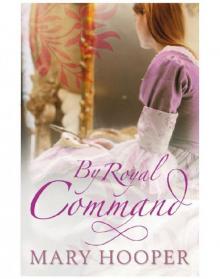 By Royal Command
By Royal Command Newes from the Dead
Newes from the Dead Amy
Amy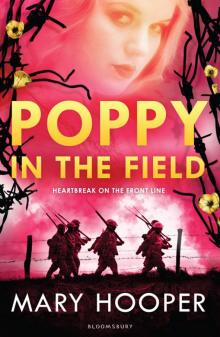 Poppy in the Field
Poppy in the Field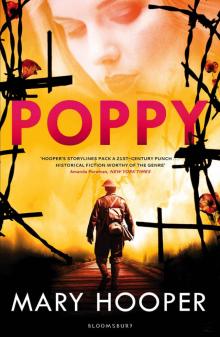 Poppy
Poppy Velvet
Velvet At the House of the Magician
At the House of the Magician The Remarkable Life and Times of Eliza Rose
The Remarkable Life and Times of Eliza Rose Chelsea and Astra
Chelsea and Astra The Betrayal
The Betrayal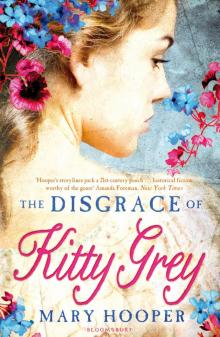 The Disgrace of Kitty Grey
The Disgrace of Kitty Grey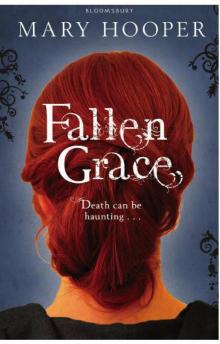 Fallen Grace
Fallen Grace